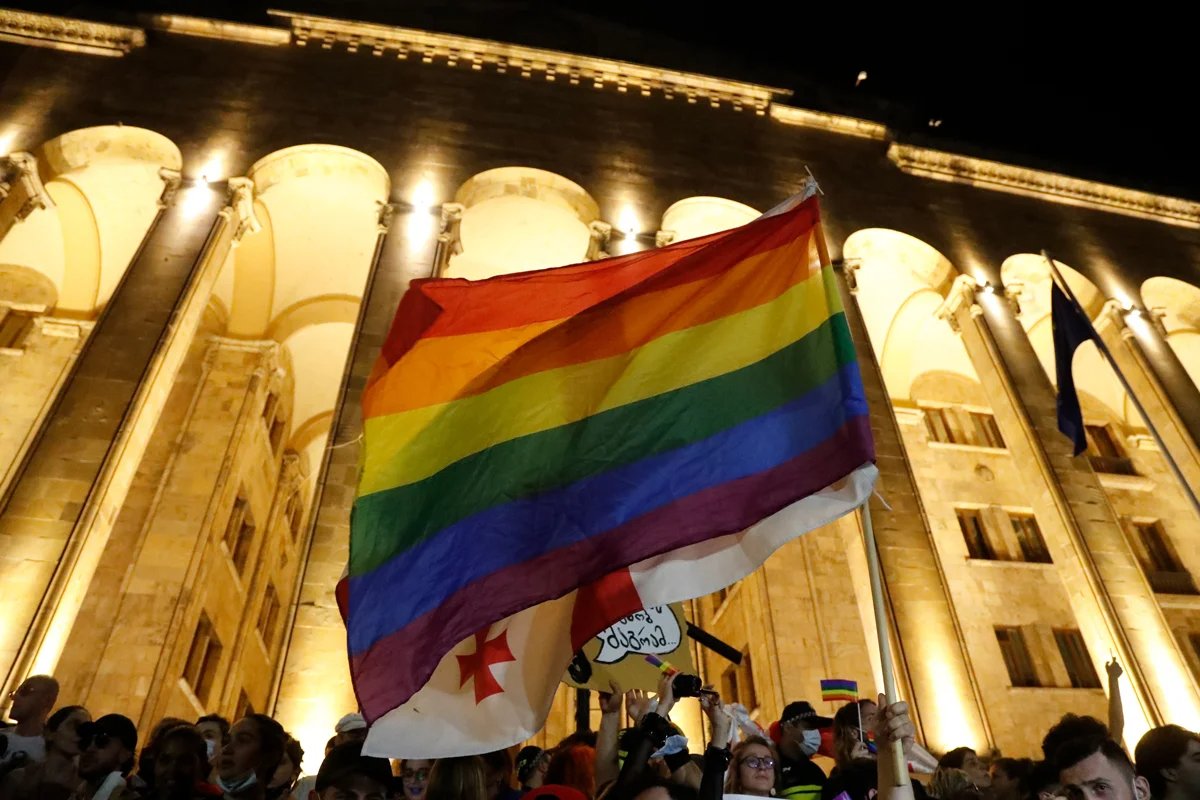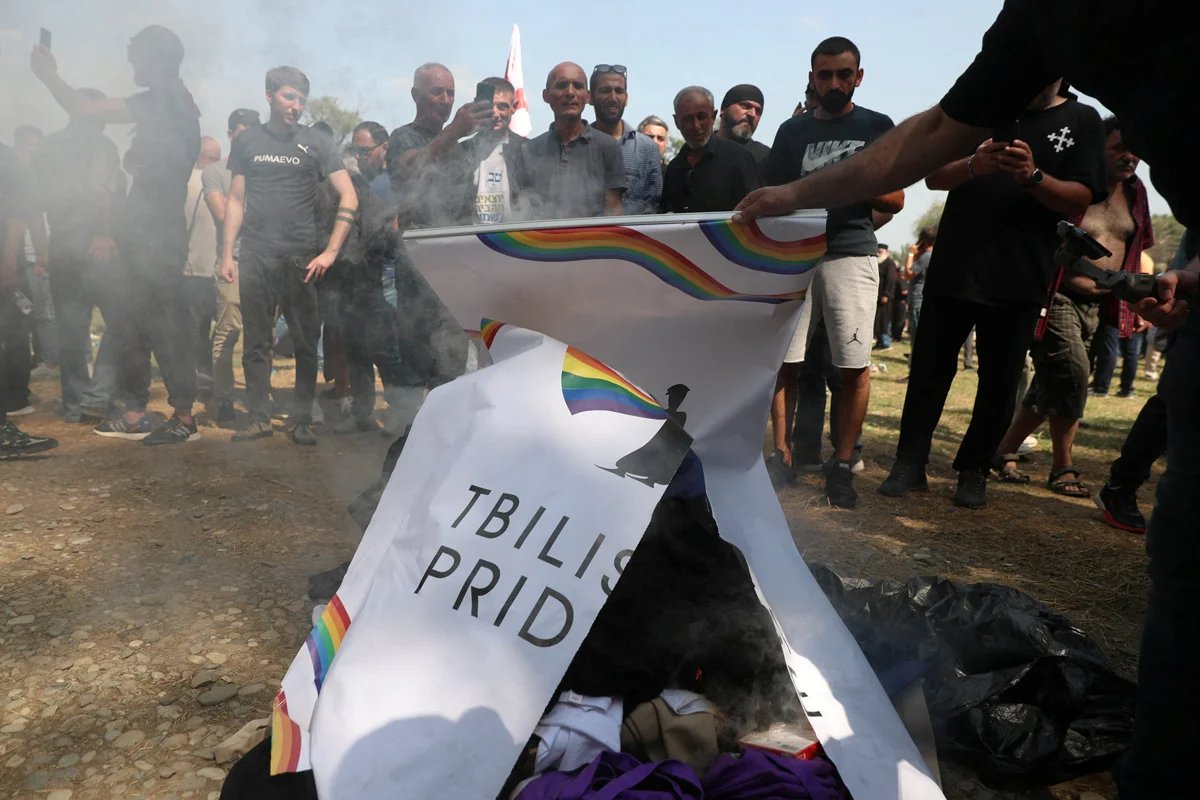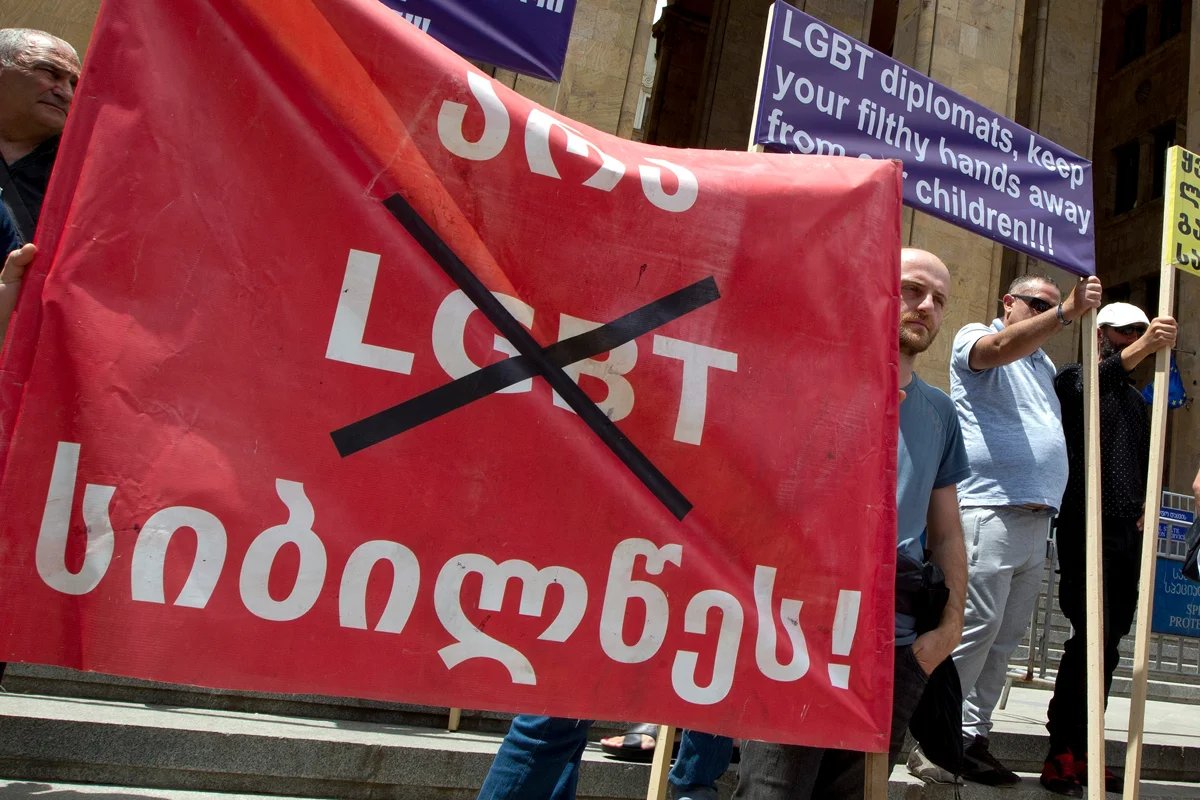On 17 September the Georgian Parliament passed a package of 19 laws which, according to the ruling Georgian Dream party, were aimed at promoting “family values” and the “protection of minors”, but in actual fact were a set of deeply repressive and homophobic measures aimed at mobilising support from the country’s ultraconservative far right.
As well as introducing a specific ban on same-sex marriage, same-sex adoption, and providing gender reassignment surgery, the law makes the dissemination of so-called “LGBT propaganda” and the promotion of queer identities in schools and the media an offence.
A day after the law was passed, Georgia’s best known transgender woman was brutally murdered, underscoring the huge amount of damage the legislation is likely to wreak on queer lives in the South Caucasus nation.
Political homophobia
It’s unclear why the ruling Georgian Dream party felt the need to hastily adopt a law promoting “family values” and the “protection of minors” or even why it made the fight against same-sex partnerships an electoral campaign pledge in the first place.
After all, Georgian law doesn’t allow same-sex couples to marry or adopt children, and the only way to legally change your gender assigned at birth is via the European Court of Human Rights in Strasbourg.
Given the drop in support for Georgian Dream in recent months, most commentators suspect that the authorities are simply attempting to rally the radically conservative elements of Georgia’s electorate by exploiting an emotive issue in the run-up to next month’s election.
The new law on “family values and the protection of minors” will impose sweeping curbs on LGBT rights, according to Reuters. While it confirms an existing ban on same-sex marriage and gender reassignment surgery, it now provides a legal basis for authorities to outlaw Pride events and public displays of the LGBT rainbow flag under the broad banner of LGBT propaganda, while imposing censorship by threatening freedom of speech, a civil right that was previously protected under the constitution.
As the concept of LGBT propaganda is so vague, it remains to be seen how this will work in practice. The law could lead to censorship on television and affect schools, advertisers and even cinemas.

LGBT rally in front of the parliament building in Tbilisi, Georgia, 5 July 2021. Photo: Zurab Kurtsikidze / EPA-EFE
In late June, the Venice Commission of the Council of Europe published a devastating excoriation of the draft law, saying it discriminated against the LGBT community, was inconsistent with the European Convention on Human Rights, and was reminiscent of similar legislation on the prohibition of the so-called “propaganda of homosexuality” in other countries, such as Russia.
EU High Representative for Foreign Affairs and Security Policy Josep Borrell and the foreign ministries of Germany, Estonia, Norway and the UK have all condemned the law and have called for it to be repealed, something rejected by Georgian Dream, who denied that the pre-election initiative had anything to do with comparable Russian legislation.
After months of political unrest played out across Georgia following the government’s forcing through of the deeply unpopular so-called “Russian law”, which requires NGOs receiving over 20% of their funding from abroad to register as foreign agents, Georgian Prime Minister Irakli Kobakhidze was ready for the critics this time.
Kobakhidze insisted the new law was in no way similar to Russian anti-LGBT legislation and said its true aim was to improve the image of Europe in Georgia. “The Georgian people must not associate Europe with a lack of transparency and LGBT propaganda… That won’t do anything for the EU’s image in Georgian society. For us, Europe is primarily about transparency, traditional values, Christian values… But if, by contrast, we are told that the EU now appears to run counter to Christian traditions, then that is unacceptable,” Kobakhidze said.

Kesaria Abramidze. Photo: kesaria_official / Instagram
Transgender figurehead
Just one day after the new law was adopted, Georgia’s most famous transgender woman was murdered in her Tbilisi apartment.
Kesaria Abramidze — known as Keso to her friends — was a model and celebrity who once represented Georgia at the Miss Star International transgender beauty pageant in Barcelona, and who was a frequent guest on Georgian talk shows.
Just a couple of hours before she was murdered, Abramidze, who had over 500,000 followers on Instagram — no small feat in a country with a population of under 4 million — had posted a photo of herself and her partner, Beka Dzhaiani, on social media for the first time.
Neighbours confirmed that the couple had been together for two years, but that the 26-year-old Dzhaiani had wanted to keep the relationship quiet. In fact, their relationship was anything but, as Kesaria revealed in a post on social media in April, in which she admitted that she had “been in a toxic relationship for almost two years” and that she had been manipulated and abused by her partner, and had at one point even fled the country to escape Dzhaiani’s violent attacks.

Beka Dzhaiani and Kesaria Abramidze. Photo: kesaria_official / Instagram / Radio Tbilisi
The photo appears to have been the cause of the couple’s final conflict, according to Georgian public broadcaster 1TV, which reported that Dzhaiani had gone to Kesaria’s apartment in Tbilisi on 18 September, having bought a knife a few hours earlier, according to the Prosecutor’s Office.
Surveillance camera footage establishes that Dzhaiani was only there for 14 minutes. Running down the stairs, he ran into a neighbour who was heading up to Kesaria’s apartment, having heard her scream. By then, however, Kesaria was already dead, having been stabbed 28 times.
Dzhaiani attempted to flee the country but was detained three hours from Tbilisi near Kutaisi Airport.
The case has been classified as a gender-based crime, and Dzhaiani has been charged with “premeditated murder committed under aggravating circumstances and with particular cruelty on the basis of gender”, for which he faces 16 to 20 years in prison or even life without the possibility of parole if found guilty.
While lawyers said that Kesaria had previously contacted the police to report Dzhaiani’s domestic abuse, “protection was not forthcoming”.
Systemic indifference
Georgian Dream Deputy Nino Tsilosani, who heads the Parliamentary Council on Gender equality, has taken up Kesaria’s case. “It’s very hard for me to talk about this tragedy. I can’t find the words … Kesaria was probably the victim of violence at her partner’s hands more than once, and now it has ended so sadly…” Tsilosani wrote on Facebook.
Tsilosani was the first government official to comment publicly on the murder, but she ignored accusations that by pushing through the new anti-LGBT law, Georgian Dream was guilty of inciting hatred against the LGBT community.
In a video that has been watched tens of thousands of times online, popular Georgian TV presenter Maia Asatiani said she believed that “anyone who calls this a case of domestic violence” and rejects any connection to the new law should be considered “an accomplice to the next murder”.

Anti-LGBT protesters break through a police cordon and burn posters in the area reserved for Tbilisi Pride, 8 July 2023. Photo: Irakli Gedenidze / Reuters / Scanpix / LETA
“Even though she was a victim of violence, she couldn’t go to the police because she couldn’t be sure the police wouldn’t be predatory themselves, make inappropriate jokes or bring up the fact that she was born male,” Asatiani said.
“The authorities have codified in law that people like Keso should not exist in Georgia,” she added. “We are told that our main enemy is people of a different orientation. No such person can feel safe now.”
Human rights organisations agree that even if the motive for Kesaria’s murder turns out to have been personal, her murder should nevertheless set off alarm bells in light of Georgia’s new homophobic legislation.
An increasing number of Georgians now worry that the policies of Georgian Dream may end up depriving them of visa-free travel to Europe, one of the hard-won benefits of Georgia’s years-long association with the EU.
Georgian President Salome Zourabichvili, a pro-European liberal who has resisted Georgian Dream’s right-wing and pro-Russian drift, described Kesaria’s murder as “inhumane”, adding that she hoped it would save as a wake up call for a society “imbued with a hatred that allows enemies to manipulate, weaken and divide us.”
A rally in honour of Kesaria was held near the parliament building in Tbilisi just two days after a majority of Georgian parliamentarians voted to approve the law banning “LGBT propaganda”.
On the steps of the square, people laid out photos, candles, flowers and signs with slogans including “No to fascist legislation” and “84 people have made murder legal”, and listing the names of three other transgender women who have been killed since Georgian Dream came to power in 2012.
The electoral pledges being made by Georgian Dream have already led to the country’s previously close ties to the EU and the US taking a nosedive. Having finally received EU candidate status in December on the understanding that Tbilisi would bring its legislation into line with European law, the bloc has now suspended it indefinitely.
An increasing number of Georgians now worry that the policies of Georgian Dream may end up depriving them of visa-free travel to Europe, one of the hard-won benefits of Georgia’s years-long association with the EU. According to a European Commission spokesperson, the EU is “considering all options,” including ending the visa-free regime if “democracy in Georgia continues to regress”.

Suspect in the Abramidze murder is escorted by police officers. Photo: MiaOfGeorgia / YouTube
Shattered dream
Hard though it may be to believe, a decade ago Georgian Dream adopted a law aimed at combating discrimination in Georgian society, including on the basis of sexual orientation and gender identity.
The law was a progressive one that met the requirements of Georgia’s Association Agreement with the EU, according to Ana Subeliani, co-director of influential Georgian NGO Tbilisi Pride, who added that shortly after Georgian Dream came to power, Georgia “ranked first in the region in terms of LGBT rights, and was even ahead of some European countries.”
“Georgia used to have legislation protecting the LGBT community, Subeliani says, adding that “it’s now the opposite” and noting that all mention of the LGBT community had been removed from Georgia’s National Human Rights Strategy in 2022. “Whereas we used to demand improvement, we’re now seeing regression at the legislative level. This is a very dangerous trend.”
Three surveys conducted by Tbilisi Pride in 2022 showed that 47% of respondents believed that LGBT rights should be protected and that LGBT groups should have the right to hold public demonstrations, according to Subeliani, a definite sign of changing attitudes, as just a few years beforehand just 27% had voiced the same opinion. .
“But there is political homophobia in the country, especially among those in power. They’re using homophobia to shore up their power. There’s nothing else left,” Subeliani continues.

Far-right activists hold a banner reading ‘No to LGBT darkness’ at a rally against Pride Week, 2 July 2022. Photo: Shakh Aivazov / AP Photo / Scanpix / LETA
Indeed, when the Georgian Parliament debated the National Human Rights Strategy in March 2023, opposition deputy Khatuna Samnidze pointed out that one of the prime minister’s advisers couldn’t even bring himself to say the words “sexual minorities” or “LGBT rights” during the session.
“Lesbian, gay, bisexual and transgender rights are human rights. Sexual minority rights should be mentioned in the human rights strategy,” Samnidze said during the session.
“Pro-government sources said my speech was ‘LGBT propaganda’. The topic of minority rights is not all that popular in society. It doesn’t win votes,” Samnidze told Novaya Europe. “The authorities use homophobia as propaganda. Raising such issues in a patriarchal society is difficult as you’re attacked from all sides.”
“Vulnerable people have become a tool in this struggle. This goes against European rules and against the conditions we had to meet to be given EU candidate status,” she stresses. “The authorities have been conducting a homophobic campaign and spreading hatred for several months, so homophobes have a feeling of impunity.”
However, the public debate that followed Kesaria Abramidze’s murder has shown that Georgian society is actually quite tolerant, Samnidze observes. “Aggressive homophobes are in a minority, it’s just that the authorities are courting them.”

